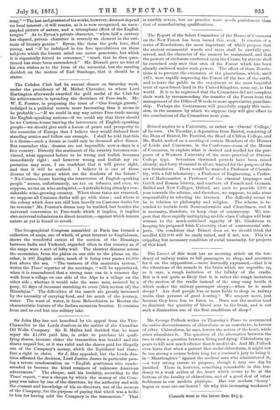A large meeting was held at Willis's Rooms on Friday
week to further the project of founding a Memorial to Lord Byron. Mr. Disraeli was in the chair, and warmly advocatql the project. He _ extolled Byron's poetry for the "sublime energy of imagination" it displayed, and declared with exaggerative rhetoric that in Greece there "is not a cape, a promontory, or a column that he has not touched with the fire or suffused with the sweetness of his
• -song." "The last and greatest of his works, however, does not depend on local interest ; it will remain, as it is now recognised, an unex- ampled picture of nature, and a triumphant effort of the English tongue." As to B3rron's private character, "when half a century has elapsed, private character is scarcely an element in the esti- mate of literary genius." Byron, like those the gods love, died young, and "if he indulged in too free speculations on those subjects which the human mind can never penetrate, but which it is organically forced to reverence," "much that he then ques- tioned has since been surrendered." Mr. Disraeli gave no hint of his own wishes as to the form of the memorial, but the meeting ,decided, on the motion of Earl Stanhope, that it should be a statue.



































 Previous page
Previous page